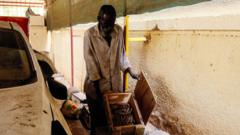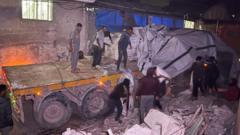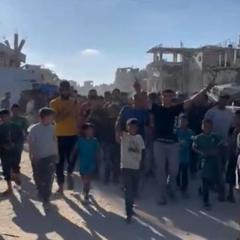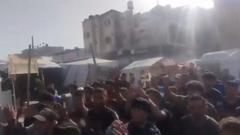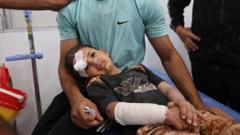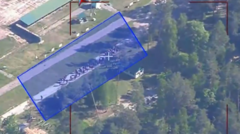Following a partial lifting of the Israeli blockade, the limited food supply arriving in Gaza has led to overwhelmed bakeries and violent confrontations over humanitarian convoys. With escalating lawlessness and a dire humanitarian situation, international organizations warn that current aid levels fall far short of what is required for the 2.1 million inhabitants.
Humanitarian Crisis Deepens in Gaza Amid Chaos and Desperation
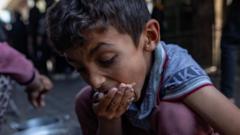
Humanitarian Crisis Deepens in Gaza Amid Chaos and Desperation
As aid trickles into Gaza, chaos reigns with widespread hunger prompting violent incidents, highlighting the need for substantial food aid and security measures.
In the beleaguered territory of Gaza, the recent easing of an Israeli blockade has sparked desperate and chaotic scenes as food aid trickles in, only to be met with overwhelming demand. Bakeries attempting to distribute bread have been swamped by crowds, leading to the suspension of operations due to security concerns. The atmosphere is increasingly tense, with reports of looting and violent clashes between armed groups and Hamas security forces.
An incident on Thursday night involved armed looters attacking a convoy of aid trucks coordinated by the World Food Programme (WFP), which was en route to a distribution center. Eyewitness accounts describe a brief firefight between the assailants and Hamas, followed by an Israeli drone strike that reportedly killed several Hamas security personnel involved in the protection of the convoy. Hamas condemned the drone strike as a "horrific massacre," accusing Israel of targeting those tasked with safeguarding humanitarian efforts.
Despite the arrival of approximately 130 trucks carrying limited supplies over the past few days, humanitarian organizations stress that the scale of need far exceeds current deliveries. The UN estimates Gaza requires around 500 to 600 trucks of daily supplies to meet the urgent humanitarian needs of its population. Philippe Lazzarini, head of UNRWA, highlighted the dire state of affairs, expressing that looting of aid is an expected result of the deprivation faced by Gazans after more than 11 weeks of blockade.
On the ground, civilians express frustration with the current distribution methods, advocating for flour to be handed out directly to families for home baking, as opposed to crowded aid centers where chaos can ensue. Reports from residents in southern Gaza reflect worsening conditions, including widespread shortages of food, water, and medical aid.
Voices from Gaza describe a deepening humanitarian crisis. Abd al-Fatah Hussein, a displaced father, articulated the severe lack of resources and the overwhelming desperation weighing on those living in displacement camps. The ongoing military actions and airstrikes add to the trauma endured by families who are already struggling with shortages.
In the backdrop of Prime Minister Netanyahu’s statement about allowing supplies into Gaza, humanitarian agencies reiterate that the minimal amounts entering do not adequately address the catastrophic needs of the populace. UN Secretary General Antonio Guterres remarked that the volume of supplies currently entering Gaza is akin to "a teaspoon of aid when a flood of assistance is required," with significant quantities of supplies still waiting to be distributed.
As conditions continue to deteriorate, reports convey the grim reality of daily life for Gazans, with individuals enduring severe malnutrition and lack of basic healthcare. The voices of those caught in this crisis underscore the urgent need for increased humanitarian efforts and the requisite security to enable safe passage for aid. With the situation remaining volatile, the potential for further escalation remains a looming concern for both local residents and international observers.
An incident on Thursday night involved armed looters attacking a convoy of aid trucks coordinated by the World Food Programme (WFP), which was en route to a distribution center. Eyewitness accounts describe a brief firefight between the assailants and Hamas, followed by an Israeli drone strike that reportedly killed several Hamas security personnel involved in the protection of the convoy. Hamas condemned the drone strike as a "horrific massacre," accusing Israel of targeting those tasked with safeguarding humanitarian efforts.
Despite the arrival of approximately 130 trucks carrying limited supplies over the past few days, humanitarian organizations stress that the scale of need far exceeds current deliveries. The UN estimates Gaza requires around 500 to 600 trucks of daily supplies to meet the urgent humanitarian needs of its population. Philippe Lazzarini, head of UNRWA, highlighted the dire state of affairs, expressing that looting of aid is an expected result of the deprivation faced by Gazans after more than 11 weeks of blockade.
On the ground, civilians express frustration with the current distribution methods, advocating for flour to be handed out directly to families for home baking, as opposed to crowded aid centers where chaos can ensue. Reports from residents in southern Gaza reflect worsening conditions, including widespread shortages of food, water, and medical aid.
Voices from Gaza describe a deepening humanitarian crisis. Abd al-Fatah Hussein, a displaced father, articulated the severe lack of resources and the overwhelming desperation weighing on those living in displacement camps. The ongoing military actions and airstrikes add to the trauma endured by families who are already struggling with shortages.
In the backdrop of Prime Minister Netanyahu’s statement about allowing supplies into Gaza, humanitarian agencies reiterate that the minimal amounts entering do not adequately address the catastrophic needs of the populace. UN Secretary General Antonio Guterres remarked that the volume of supplies currently entering Gaza is akin to "a teaspoon of aid when a flood of assistance is required," with significant quantities of supplies still waiting to be distributed.
As conditions continue to deteriorate, reports convey the grim reality of daily life for Gazans, with individuals enduring severe malnutrition and lack of basic healthcare. The voices of those caught in this crisis underscore the urgent need for increased humanitarian efforts and the requisite security to enable safe passage for aid. With the situation remaining volatile, the potential for further escalation remains a looming concern for both local residents and international observers.



